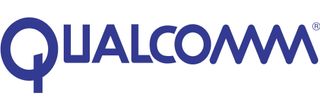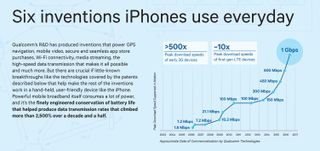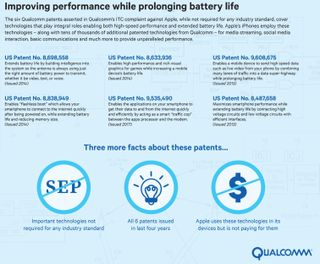Qualcomm Seeks To Halt US Import, Sales Of Apple iPhone

Update: 8:20 pm PT: Qualcomm provided a couple of clarifying statements indicating that its actions are related to iPhones that use baseband processors other than the ones provided by Qualcomm affiliates, and that its limited exclusion order pertains to future devices coming into the U.S. We have added those notes in the appropriate sections below.
The legal battle between Qualcomm and Apple is heating up. Qualcomm is seeking to block the importation and sale of Apple iPhones and other products, alleging that they infringe on six Qualcomm technology patent, mostly related to extending battery life.
Qualcomm and Apple have been embroiled in a contentious legal battle over technology royalty fees for most of this year. Apple's actions have sought to make a direct impact on Qualcomm's revenues, and the chip maker's latest move would be an audacious strike back if it were to succeed. How in the world did we get here?
In January, Apple filed lawsuits in the United States and in China alleging that Qualcomm's royalty fees are too high and the license agreements too restrictive. The lawsuits seek $1 Billion and 1 Billion Yuan in damages, respectively. During an earnings call the following week, Apple CEO Tim Cook explained that he doesn’t like resorting to litigation, but he “didn’t see another way forward."
As you can imagine, Qualcomm doesn’t agree with Apple’s stance. Don Rosenberg, Qualcomm’s executive vice president and general counsel provided a statement following the second Apple legal filing.
“These filings by Apple's Chinese subsidiary are just part of Apple's efforts to find ways to pay less for Qualcomm's technology,” said Rosenberg. “Apple was offered terms consistent with terms accepted by more than one hundred other Chinese companies and refused to even consider them. These terms were consistent with our NDRC Rectification plan. [...] Qualcomm is prepared to defend its business model anywhere in the world. We are proud of our history of contributing our inventions to the development and success of the mobile communications ecosystem."
In April, Qualcomm filed a counterclaim against Apple, seeking the court's intervention in compelling Apple to adhere to the agreements between the two companies.
Stay on the Cutting Edge
Join the experts who read Tom's Hardware for the inside track on enthusiast PC tech news — and have for over 25 years. We'll send breaking news and in-depth reviews of CPUs, GPUs, AI, maker hardware and more straight to your inbox.
Later that month, Qualcomm said that Apple had withheld royalty payments from manufacturers for work done in the first quarter of 2017, which prevented the manufacturers from paying their licensing fees to Qualcomm. In May, Qualcomm revealed that four iOS device manufacturers—Foxconn, Pegatron Corporation, Wistron Corporation, and Compal Electronics—had refused to pay technology licensing fees at the behest of their client (Apple). Apple, Qualcomm said, was refusing to pay for the company's technology while the legal battle unfolds. Those companies rely heavily on Apple’s business, naturally.

Today, Qualcomm pushed further. The company filed a complaint with the United States International Trade Commission (ITC) alleging that Apple “has engaged in the unlawful importation and sale of iPhones.” Qualcomm’s complaint suggests that the Apple iPhone infringes on up to six of Qualcomm’s patents, and the company is seeking a Limited Exclusion Order (LEO), which would bar Apple from importing iPhones and other unnamed products into the Unites States. Qualcomm clarified that the company is seeking the LEO against iPhones that use cellular baseband processors other than those supplied by Qualcomm’s affiliates.
“Qualcomm’s inventions are at the heart of every iPhone and extend well beyond modem technologies or cellular standards,” said Don Rosenberg, executive vice president and general counsel for Qualcomm. “The patents we are asserting represent six important technologies, out of a portfolio of thousands, and each is vital to iPhone functions. Apple continues to use Qualcomm’s technology while refusing to pay for it. These lawsuits seek to stop Apple’s infringement of six of our patented technologies.”
Furthermore, Qualcomm is seeking a Cease and Desist Order, which would prevent Apple from selling the hardware that is already stateside and from “marketing, advertising, demonstration, and warehousing of inventory for distribution and use of those imported products . . . " A Qualcomm spokesperson said that the limited exclusion order is for future devices, so anyone who currently owns an iPhone will not be impacted.
Which Patents Is Apple Allegedly Infringing On?
Qualcomm maintains that the latest iteration of the iPhone infringes on Qualcomm’s battery life conservation technology (US Patent No. 8,698,558; US Patent No. 8,633,936; US Patent No. 9,608,675; US Patent No. 8,487,658, US Patent No. 8,838,949). The company provided an infographic (pictured partially above, with the patents described briefly below). The company also believes that the iPhone infringes on US Patent No. 9,535,490, which “enables the applications on your smartphone to get their data to and from the internet quickly and efficiently by acting as a smart ‘traffic cop’ between the apps processor and the modem.”

The battle between Apple and Qualcomm could go on for some time. Qualcomm said it expects an ITC investigation by August, with a potential trial beginning next year.
We've also reached out to Apple for comment and will add any statements from the company when we hear back.
Kevin Carbotte is a contributing writer for Tom's Hardware who primarily covers VR and AR hardware. He has been writing for us for more than four years.
Most Popular



